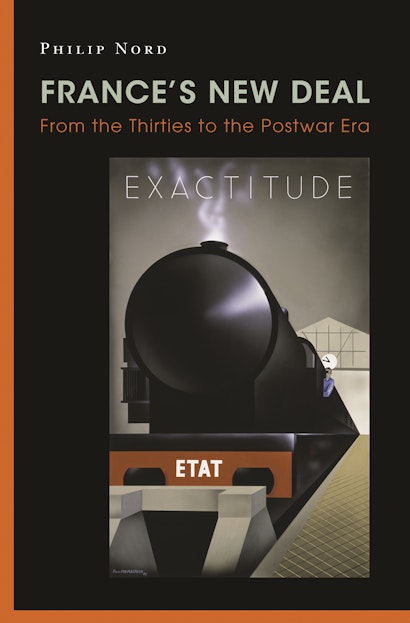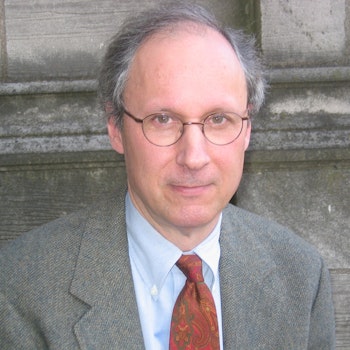France’s New Deal is an in-depth and important look at the remaking of the French state after World War II, a time when the nation was endowed with brand-new institutions for managing its economy and culture. Yet, as Philip Nord reveals, the significant process of state rebuilding did not begin at the Liberation. Rather, it got started earlier, in the waning years of the Third Republic and under the Vichy regime. Tracking the nation’s evolution from the 1930s through the postwar years, Nord describes how a variety of political actors—socialists, Christian democrats, technocrats, and Gaullists—had a hand in the construction of modern France.
Nord examines the French development of economic planning and a cradle-to-grave social security system; and he explores the nationalization of radio, the creation of a national cinema, and the funding of regional theaters. Nord shows that many of the policymakers of the Liberation era had also served under the Vichy regime, and that a number of postwar institutions and policies were actually holdovers from the Vichy era—minus the authoritarianism and racism of those years. From this perspective, the French state after the war was neither entirely new nor purely social-democratic in inspiration. The state’s complex political pedigree appealed to a range of constituencies and made possible the building of a wide base of support that remained in place for decades to come.
A nuanced perspective on the French state’s postwar origins, France’s New Deal chronicles how one modern nation came into being.
"[S]uperb. . . . [An] unparalleled contribution to the history of the state and society in France."—Paul V. Dutton, American Historical Review
"Nord offers a magisterial, highly nuanced account of the dramatic remaking of the French nation after the crushing defeat of 1940 and the empty years of occupation by the Nazis."—Choice
"Most of the time, reading a work on controversial eras of French history—and especially the Vichy regime—imparts a teeter-totter effect, as the historian seesaws between contrasting sides. Philip Nord, instead, quietly presents a convincing analysis that integrates and harmonizes the opposing sides without disservice to truth. . . . On the author's insightful telling, what was new on the modern French scene was the presence, and concerted action, of Christians committed to democracy, some of them engaged as organized partisans, others as unaffiliated individuals. The emergent model—what Nord calls 'France's "new deal"'—was a thoroughly French version of the activist state: modern and modernizing in economic life, yet allergic to liberal laissez-faire individualism."—Steve Englund, Commonweal
"[V]ery wide-ranging and informed. . . . This is a very thought-provoking work, which will be a point of reference for the discussion of French modernization in the future; it is also very well written even though it deals with daunting technical issues and is a work of primary research. It is rare to find such reader-friendly work at such a demanding level."—David S. Bell, European Legacy
"Philip Nord's new book tells a big story and teaches us something novel and important about twentieth-century France. . . . Nord's book makes an original and on the whole convincing argument."—Paul Cohen, Canadian Journal of History
"Nord's book is an important work for all of us who would protect and build on the social reforms of the Liberation movement and since; it is better to understand the original intent of the founders in order to revise their work. And Nord has given us the best history, a work that shows us not only what happened but why, the underlying motives of the time without imposing our own wishes or assumptions. In France's New Deal, Philip Nord has written a book that should be read by all, not only those interested in French history but all interested in understanding our time."—Gerald Friedman, Enterprise & Society
"Nord's work is a masterfully constructed challenge to our conventional understanding of the postwar state agenda as a new beginning in France. It invites further inquiry into the political roots and the dynamics at the origin, and the divergent developments, of 'new deals' elsewhere."—Kenneth Mouré, French Politics, Culture & Society
"Authoritative, subtle, and persuasive, this book is a major advance in conceptualizing the transformation of the French state in the mid-twentieth century. It will supersede any current literature on the subject."—Richard F. Kuisel, Georgetown University
"In this splendid book, Nord takes a big topic, and addresses it with infectious enthusiasm, rigor, and humor. Nobody else knows as much about the interconnections between the lives and careers of the midcentury elite of French administrators, experts, and intellectuals, who from the 1930s to 1950s, emerged as the ruling class of the reshaped French state."—Martin Conway, University of Oxford


